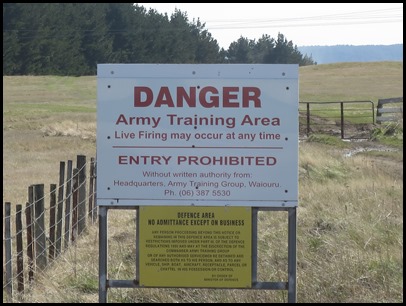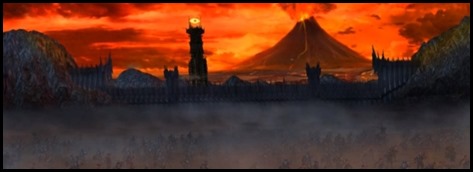To Taupo

|
To Taupo 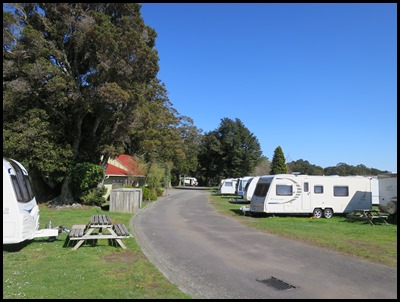 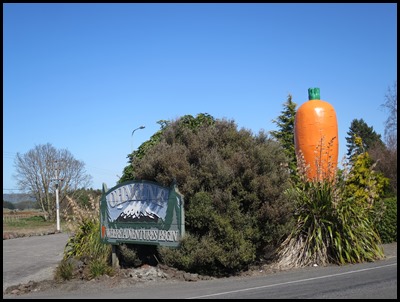 We woke to a
sunny day in Ohakune. I have to mention our camp showers, the little
building with the red roof, communal, not overly big but – wow. As you pressed
the button outside the cubicle door to engage the hot water the heated towel
rail came on and as you stepped out from under the very hot power shower you
felt the warmth from the light heater. I didn’t want the experience to end. The
very best and may I say we have both road tested a great many showers. Off we
went and said a fond farewell to the giant
carrot.
 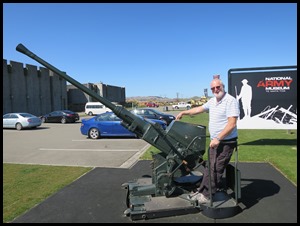 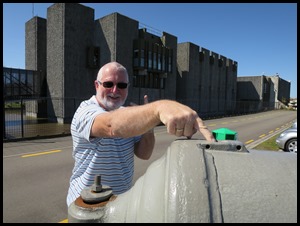 We spent the morning at the fabulous National Army Museum.
 Passing Mount Ruapehu, deadly but dangerous as we found at the site of the memorial to the
Tangiwai Rail Disaster.
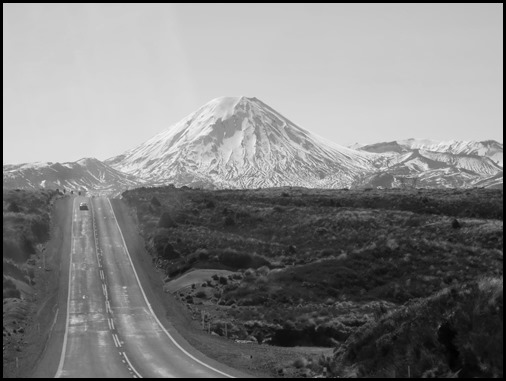 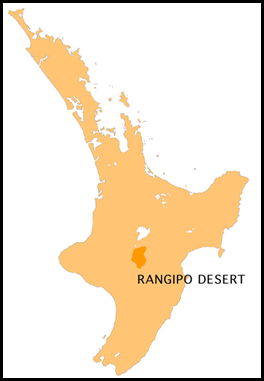 Along the Desert
Road once again.
 Rangipo Desert is a barren desert-like environment on the North Island Volcanic Plateau; to the east of the three active peaks of Mount Tongariro, Mount Ngauruhoe, and Mount Ruapehu, and to the west of the Kaimanawa Range.The Rangipo Desert receives sixty to nearly a hundred inches of rain annually, but resembles a desert because of a poor soil quality and drying winds, also due to the mass sterilization of seeds during a series of violent eruptions, particularly ignimbrite flows about 20,000 years ago. The vegetation is low and sparse, consisting of mainly tussock and snow grasses. The headwaters of many small streams, which later turn into large rivers, gouge deep serrated valleys through the unconsolidated ash and pumice-rich earth. The climate here is harsh and alpine, with close to two hundred and seventy ground frosts a year in comparison with less than thirty in the coastal regions of Hawke's Bay just fifty miles to the east. Heavy snowfalls - rarely seen in the rest of the island - are also a common occurrence in winter. Trampers and climbers in the area have to be mindful of the extreme chill effect of the cold south wind which can produce wind chill factors lowering the temperature below zero for days on end. Much of the desert lies at an altitude of over two thousand feet, and a considerable proportion of it is over three thousand three hundred feet above sea level.
Due to the unproductive nature of the land and the extreme winter climate, the region is largely uninhabited. The town of Waiouru, with its army camp, lies to the south and much of the southern part of the desert is used for training purposes. To the north of the desert lies the Rangipo prison farm. Many of the North Island's largest rivers have their headwaters in the area, particularly around the slopes of Mount Ruapehu, the North Island's highest mountain. These include the Waikato and Whangaehu Rivers, as well as major tributaries of the Rangitikei and Whanganui Rivers. The desert is bisected by only one sealed road, a section of State Highway 1 known as the Desert Road. The road is closed for short periods most winters with barriers due to severe snow storms and icy road conditions. Turangi emergency services monitor the northern part of the Desert Road and the NZ army at Waiouru is responsible for the southern end.
The Black Gate of Mordor scenes were shot in the Rangipo Desert in 2000. 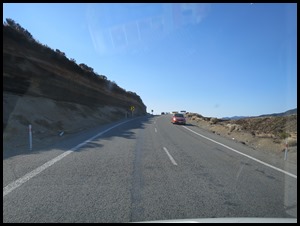 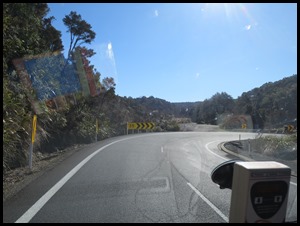 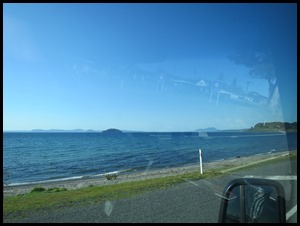 So strange to go in real terms a short
distance from desert, a few hills and wiggles and end up next to Lake
Taupo.
 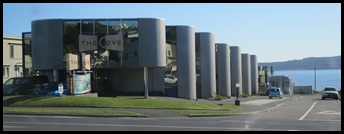 Beside the Hilton Hotel we liked the fish on the speed limit sign. The we passed trendy hotels, apartments and houses.
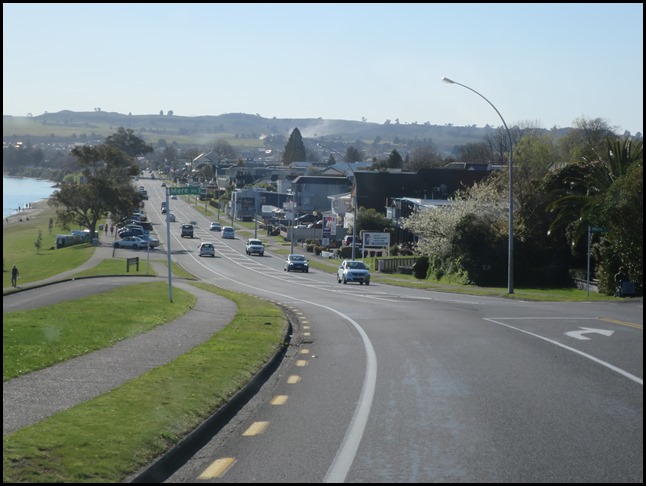 As we neared the
town we could see the famous geyser steam, a must visit. And so to camp.
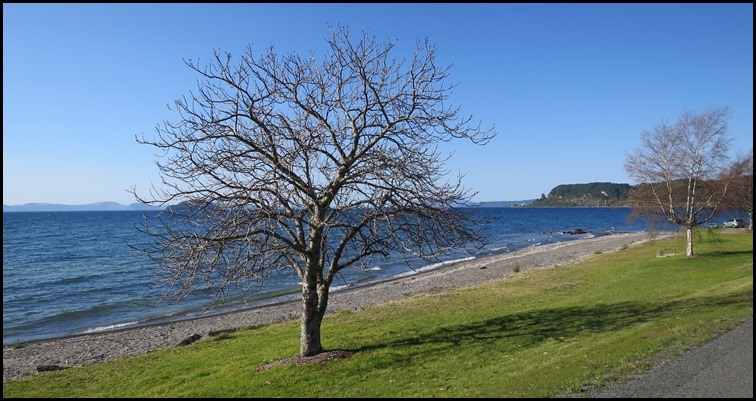 At two hundred and
thirty eight square miles Lake
Taupo is the largest lake by surface
area in New Zealand,
and the second largest freshwater
lake by
surface area in geopolitical Oceania after Lake Murray (Papua New
Guinea).
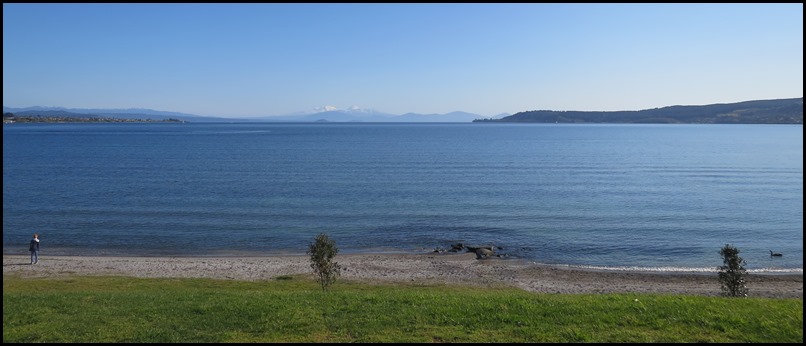
ALL IN ALL A DAY OF SO MUCH
VARIETY
A GREAT
DAY |
